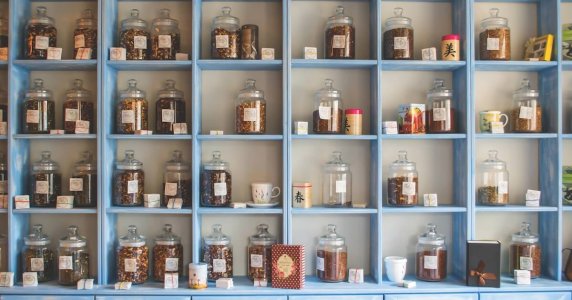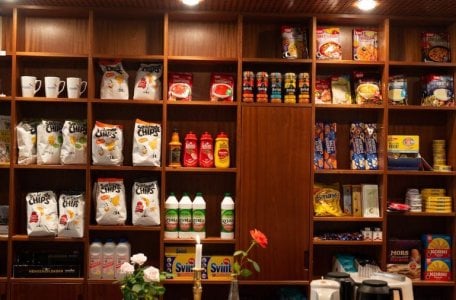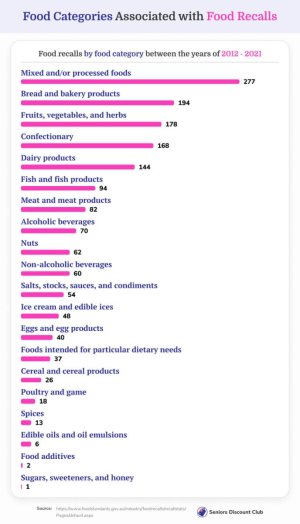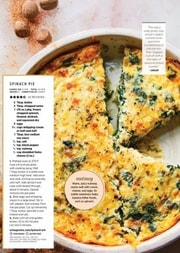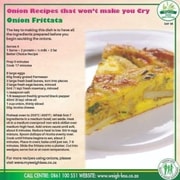12 most recalled Australian grocery items – Is your favourite pantry staple on the list?
- Replies 3
While it's not often that you’d need to read about grocery recall statistics, we think it's still smart to stay informed and updated with all necessary information and guidelines. This is especially important these days, as it seems that many of our everyday grocery items are being recalled left and right.
But thanks to data collected by Food Standards Australia (FSANZ), shoppers have been given a glimpse into the most commonly recalled products in the country.
As grocery shoppers, it’s easy to trust that the food we buy off the shelves is safe and free from contamination or tampering. However, this isn’t always the case. Each week, numerous supermarket products are taken off the shelves and recalled by their suppliers due to various issues, such as undeclared allergens or microbial contamination.
Just recently, a recall was issued for OzEmite Yeast Spread Gluten free because of an undeclared allergen. The reports said this allergen could cause a severe allergic reaction if consumed. Manufacturer Spring Gully apologised to their customers, reassuring everyone that the safety of consumers is their ‘top priority’. You can read more details about this recall here.
According to the data collated by FSANZ, most of them are ‘precautionary and initiated by food businesses to ensure that potentially unsafe food is removed from distribution and sale’.
‘Only a small amount of recalls are linked to a suspected or confirmed illness/injury.’
Moreover, FSANZ also reassured everyone that an increase in food recalls means that ‘the system works’ in terms of safeguarding the food supply.
‘Over time, broader regulatory oversight, improved self-monitoring by food businesses and greater consumer vigilance have helped to strengthen problem detection,’ FSANZ stated.
What supermarket staples are most often recalled?
According to reports, mixed and/or processed foods are at the top of the list because of undeclared allergens. This includes snack foods, powders, and frozen meals.
Between 2012 and 2021, there were a total of 97 recalls for these types of products.
Another commonly recalled staple is confectionary – also due to the possibility of undeclared allergens.
During the same time frame, 51 of these products were recalled.
Commonly recalled products containing undeclared allergens included the following:
On the other hand, the supermarket staple that was most commonly recalled in the country was dairy products over fears of microbial contamination.
A total of 51 recalls for these products were reported between 2012 and 2021.
The other most commonly recalled products containing microbial contamination were as follows:
Lastly, recalls due to biotoxins occur periodically, with the number of recalls over the past 10 years ranging between 1 and 15 each year.

Knowledge is power, so make the most of this information and be aware of these commonly recalled products. We’re also curious to know what you think of these statistics, so share your thoughts with us in the comments below!
But thanks to data collected by Food Standards Australia (FSANZ), shoppers have been given a glimpse into the most commonly recalled products in the country.
As grocery shoppers, it’s easy to trust that the food we buy off the shelves is safe and free from contamination or tampering. However, this isn’t always the case. Each week, numerous supermarket products are taken off the shelves and recalled by their suppliers due to various issues, such as undeclared allergens or microbial contamination.
Just recently, a recall was issued for OzEmite Yeast Spread Gluten free because of an undeclared allergen. The reports said this allergen could cause a severe allergic reaction if consumed. Manufacturer Spring Gully apologised to their customers, reassuring everyone that the safety of consumers is their ‘top priority’. You can read more details about this recall here.
According to the data collated by FSANZ, most of them are ‘precautionary and initiated by food businesses to ensure that potentially unsafe food is removed from distribution and sale’.
‘Only a small amount of recalls are linked to a suspected or confirmed illness/injury.’
Moreover, FSANZ also reassured everyone that an increase in food recalls means that ‘the system works’ in terms of safeguarding the food supply.
‘Over time, broader regulatory oversight, improved self-monitoring by food businesses and greater consumer vigilance have helped to strengthen problem detection,’ FSANZ stated.
What supermarket staples are most often recalled?
According to reports, mixed and/or processed foods are at the top of the list because of undeclared allergens. This includes snack foods, powders, and frozen meals.
Between 2012 and 2021, there were a total of 97 recalls for these types of products.
Another commonly recalled staple is confectionary – also due to the possibility of undeclared allergens.
During the same time frame, 51 of these products were recalled.
Commonly recalled products containing undeclared allergens included the following:
- Breads and bakery products (48 recalls)
- Non-alcoholic beverages (19)
- Salts, stocks, sauces, and condiments (18)
- Nuts (16)
- Meat (13)
- Ice cream (13)
- Fish (12)
- Cereal (12)
- Poultry (11)
- Fruit, vegetables, and herbs (7)
- Alcoholic beverages (7)
- Dairy products (5)
On the other hand, the supermarket staple that was most commonly recalled in the country was dairy products over fears of microbial contamination.
A total of 51 recalls for these products were reported between 2012 and 2021.
The other most commonly recalled products containing microbial contamination were as follows:
- Dairy products (51 recalls)
- Fruit, vegetables and herbs (41)
- Meat (32)
- Mixed and/or processed foods (19)
- Non-alcoholic beverages (14)
- Egg and egg products (13)
- Fish and fish products (13)
- Nuts (5)
- Breads and bakery products (3)
- Spices (3)
- Poultry (2)
- Confectionary (1)
Lastly, recalls due to biotoxins occur periodically, with the number of recalls over the past 10 years ranging between 1 and 15 each year.
Key Takeaways
- The most commonly recalled supermarket products in Australia have been revealed, with mixed and/or processed foods topping the list.
- Most recalls are precautionary and initiated by food businesses to ensure potentially unsafe food is removed from distribution and sale.
- The most common undeclared allergen in these recalls was milk, followed by peanuts and tree nuts.
- Recalls for undeclared allergens, microbial contamination, chemical/contaminant, and 'other' are on the rise, while recalls for 'foreign matter' are on the decline.

